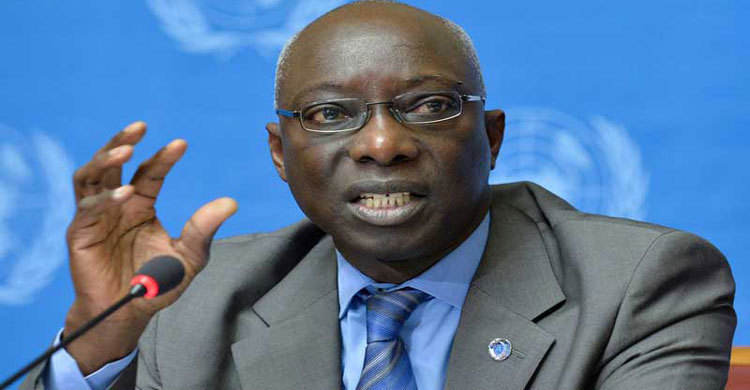Root causes of Rohingya crisis must be addressed: UN

United Nations Under-Secretary-General and Special Adviser on the Prevention of Genocide Adama Dieng here on Saturday commended the commitment demonstrated by the Bangladesh government in supporting the Rohingyas and highlighted that the root causes of the Rohingya crisis in Myanmar must be addressed.
“The Bangladeshi people demonstrated very early on its solidarity towards the Rohingya people, providing them with shelter and support when they arrived,” he told the closing session of a two-day event titled “Fostering Peaceful and Inclusive Communities in Bangladesh: The Role of Religious Leaders and Actors” in a city hotel.
United Nations Office on Genocide Prevention and the Responsibility to Protect and the United Nations Development Programme (UNDP) jointly organized the event in partnership with the Save and Serve Foundation on 22-23 June.
Adama Dieng said religious leaders can play a very important role by promoting messages of peace and tolerance and by fostering dialogue between the Rohingyas and host communities.
The UN under-secretary general expressed his optimism that the religious leaders and actors, as well as policy makers and civil society representatives will continue to show this same humanity.
He stressed the importance of ensuring that Rohingya are given opportunities to uplift themselves educationally and have access to livelihood opportunities in Bangladesh until they can return to Myanmar.
During the event, Prime Minister’s Principal Secretary Md Nojibur Rahman, conveyed Sheikh Hasina’s message of support for interfaith initiatives that promote social cohesion and respond to pressing development challenges in Cox’s Bazar District resulting from the influx of Rohingya refugees.
Stressing that the government of Bangladesh was fully committed to working with the United Nations and civil society to address the Rohingya crisis, the principal secretary encouraged religious leaders to support this cause.
United Nations Resident Coordinator in Bangladesh Mia Seppo emphasized in her remarks that “the government and the people of Bangladesh are the biggest donors to the Rohingya response.
The United Nations is committed to assisting Bangladesh, but it was host communities in Cox’s Bazar who were the true ‘first responders’.
She praised Bangladeshi host communities for their compassion, stating that Bangladesh’s traumatic experience in 1971, with millions of Bangladeshis forced to flee as refugees, had made the country particularly noble and generous towards refugees from other nations.
Seppo also underlined that the biggest challenge in the region is to ensure a sense of hope for a better future, and that interventions need to address the urgent needs of Bangladeshi host communities affected by the crisis, just as they also aim to improve conditions for the refugees themselves.
The meeting also focused on how the Plan of Action for Religious Leaders and Actors to Prevent Incitement to Violence that Could Lead to Atrocity Crimes, developed by the Office on Genocide Prevention and the Responsibility to Protect and launched by the United Nations Secretary General in July 2017, could be implemented in the areas in Cox’s Bazar affected by the Rohingya crisis.
Source: BSS



